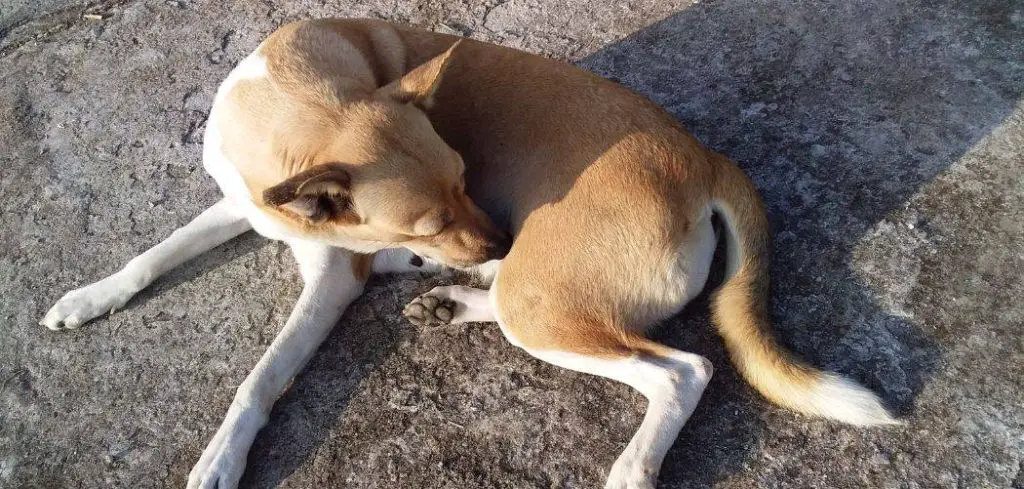Dogs licking or chewing their paws occasionally is normal grooming behavior. But when it becomes excessive, it can signal irritation or an underlying health problem that needs attention.
We outline the common reasons why a dog may excessively lick and chew their paws what you can do at home, and when to seek veterinary help.
Dog Excessively Licking and Chewing Paws — Why It Happens
When a dog excessively licks or chews its paws, it usually points to an underlying issue causing discomfort or irritation. This behavior may be linked to allergies, infections, parasites, injuries, or even stress. Since paws are sensitive and often exposed to the ground, they are prone to irritation and trauma.

Dog Excessively Licking and Chewing Paws: Common Causes
Allergies
Allergies are one of the most common reasons dogs lick and chew their paws. Food sensitivities, environmental triggers like pollen, dust, or mold, and even certain cleaning products can lead to itchy paws.
Dogs may obsessively lick and chew in an attempt to soothe the itch. Over time, this can cause redness, swelling, and secondary infections.
Read more: Old Dog Excessively Licking Paws (Here’s Why)
Yeast or Bacterial Infections
Moisture trapped between the toes can create the perfect environment for yeast or bacterial infections.
Dogs with these infections often develop foul-smelling, itchy paws that become red and irritated.
The constant licking and chewing only make matters worse, spreading the infection further and causing pain.
Parasites
Fleas, ticks, and mites can all cause itching and irritation that leads a dog to focus on its paws. Mange, caused by mites, often leads to intense itching and chewing that damages the skin.
Even a small number of fleas can cause a strong allergic reaction, leading to excessive paw licking and chewing.
Injuries or Foreign Objects
Cuts, scrapes, splinters, or small objects like burrs can easily get lodged in a dog’s paw pads.
Because paws are sensitive, dogs often lick and chew to try to remove the irritant or soothe the pain. If not addressed, this behavior can worsen the injury and lead to infection.
Anxiety or Stress
Sometimes the cause is behavioral rather than physical. Dogs experiencing stress, separation anxiety, or boredom may lick or chew their paws compulsively as a coping mechanism.
This is similar to how humans might bite their nails when anxious. Over time, this repetitive behavior can lead to sores, hair loss, and skin thickening.
Dry or Irritated Skin
Paw pads exposed to hot pavement, icy sidewalks, or harsh chemicals like de-icing salts can become dry, cracked, and irritated.
Dogs often lick and chew in response to the discomfort. Without intervention, this can worsen and make it painful for them to walk.
What to Do If Your Dog Is Excessively Licking and Chewing Their Paws
If a dog is showing this behavior, start by examining its paws carefully. Look for cuts, swelling, or foreign objects. Gently clean the area with warm water and mild pet-safe soap to remove irritants.
At home, paw soaks in diluted antiseptic solutions or Epsom salt can help reduce inflammation and soothe discomfort. Keeping the paws clean and dry is essential, especially after walks on dirty or damp surfaces.
Consider possible allergy triggers. Switching to a hypoallergenic diet or limiting exposure to grass, pollen, or household cleaners may help. Regular paw wiping after outdoor activities can reduce allergen buildup.
If the licking seems related to stress or boredom, providing more exercise, enrichment toys, and interactive play may reduce the behavior. Calming aids, such as pheromone sprays, may also help.
Most importantly, prevent self-injury by discouraging constant licking. An Elizabethan collar or protective dog booties can limit access until the underlying cause is treated.
When to Call or Visit Your Vet
If a dog’s paw licking and chewing continues for more than a few days, it’s best to consult a veterinarian. Signs such as swelling, bleeding, foul odor, limping, or hair loss are red flags that require medical attention.
Dogs who develop sores, open wounds, or show signs of severe discomfort should not wait for home remedies. These cases may require prescription medications like antibiotics, antifungal treatments, or allergy management plans.
Also, if the behavior appears suddenly and intensely, it may signal something lodged in the paw or an infection that needs prompt care. Behavioral causes can also be addressed by a vet, sometimes with the help of trainers or behaviorists.
Read more: Dog licking paws excessively (What it means)
Key Takeaway
Excessive licking and chewing of paws in dogs is more than just a bad habit — it’s often a sign of irritation, infection, or stress.
While some causes are minor and can be managed at home, others require veterinary diagnosis and treatment.
Pay close attention to changes in a dog’s behavior, and don’t ignore persistent licking. By acting early, pet owners can ease their dog’s discomfort, prevent further complications, and ensure their paws remain healthy and pain-free.
